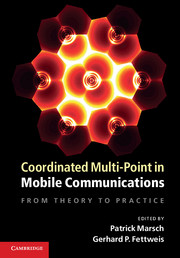Book contents
- Frontmatter
- Contents
- List of Contributors
- Acknowledgements
- List of Abbreviations
- Nomenclature and Notation
- Part I Motivation and Basics
- Part II Practical CoMP Schemes
- 5 CoMP Schemes Based on Interf.-Aware Transceivers or Interf. Coord.
- 6 CoMP Schemes Based on Multi-Cell Joint Signal Processing
- Part III Challenges Connected to CoMP
- Part IV Performance Assessment
- Part V Outlook and Conclusions
- References
- Index
6 - CoMP Schemes Based on Multi-Cell Joint Signal Processing
from Part II - Practical CoMP Schemes
Published online by Cambridge University Press: 05 August 2012
- Frontmatter
- Contents
- List of Contributors
- Acknowledgements
- List of Abbreviations
- Nomenclature and Notation
- Part I Motivation and Basics
- Part II Practical CoMP Schemes
- 5 CoMP Schemes Based on Interf.-Aware Transceivers or Interf. Coord.
- 6 CoMP Schemes Based on Multi-Cell Joint Signal Processing
- Part III Challenges Connected to CoMP
- Part IV Performance Assessment
- Part V Outlook and Conclusions
- References
- Index
Summary
In this chapter, we focus on CoMP schemes where user data or received signals connected to multiple users are exchanged between base stations for joint signal processing. Such schemes promise larger spectral efficiency gains than pure interference coordination techniques, but typically come at the price of larger backhaul requirements and (particularly in the downlink) more severe synchronization requirements. After Sections 6.1 and 6.2 introduce centralized and decentralized uplink CoMP schemes, respectively, 6.3 and 6.4 focus on the downlink.
Uplink Centralized Joint Detection
In this section, uplink centralized joint detection with infinite or limited backhaul capacity is studied, as already introduced in Section 4.3.1. A cluster of base stations (BSs) sends either raw or preprocessed receive signals from the user equipments (UEs) to a CoMP central unit (CCU), where joint processing is performed to deal with inter-cell interference. The CCU can be a separate entity, or any of the BSs involved in the cooperation. This is practical in systems such as LTE-A employing a flat network architecture. The detection algorithms are applicable to various static or dynamic clustering schemes as described in Chapter 7.
Introduction
When multiple BSs are connected via perfect backhaul links with infinite capacity, uplink centralized joint detection resembles a multiple access channel (MAC) problem, where the CCU is a super-receiver, and the BSs form a distributed antenna system (DAS) [Mol01].
Information
- Type
- Chapter
- Information
- Coordinated Multi-Point in Mobile CommunicationsFrom Theory to Practice, pp. 81 - 136Publisher: Cambridge University PressPrint publication year: 2011
